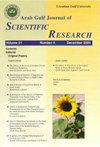Assessment of the healthcare workers’ physical, educational and operational needs during the COVID-19 pandemic in Bahrain
Q4 Business, Management and Accounting
引用次数: 0
Abstract
PurposeThis study sought to understand the physical, educational and operational needs faced by healthcare workers (HCWs) (including physicians, nurses and allied health workers) during the COVID-19 pandemic.Design/methodology/approachA descriptive cross-sectional design was undertaken. HCWs working in hospitals, health centers, testing and quarantine areas in the Kingdom of Bahrain were invited to complete the online survey questionnaire developed by authors containing three domains: physical, educational, and perceived knowledge, and operational needs.FindingsA convenient sample (N = 627) of volunteered participants responded to the online survey. The biggest challenges that HCWs were exposed to are physical needs (experiencing dry hands, difficulty breathing while on a mask, feeling hot and sweaty, and less fluid and food intake) which were reported as the higher level, followed by operational needs (limited communication due to Personal Protective Equipment - PPE - use, longer working hours, and preparation time to get ready for duty). Other challenges pertained to education and knowledge (the presence of multiple sources of information confused them during the care practices). Females faced more challenges than males, and Bahraini HCWs handled challenges more than non-Bahrainis. A negative relationship was found between age and years of experience with the challenges of the HCWs.Originality/valueDuring the COVID-19 pandemic, health systems face rapidly increasing demands. HCWs face several challenges while providing patient care, particularly physical needs. This study provides adequate data for healthcare administrators to maintain a safe working environment during pandemics.评估巴林2019冠状病毒病大流行期间医护人员的身体、教育和业务需求
目的本研究旨在了解COVID-19大流行期间卫生工作者(包括医生、护士和专职卫生工作者)面临的身体、教育和业务需求。设计/方法/方法进行了描述性横断面设计。邀请在巴林王国的医院、保健中心、检测和隔离区工作的卫生保健员完成由作者编制的在线调查问卷,其中包含三个领域:身体、教育和感知知识,以及业务需求。一个方便的样本(N = 627)自愿参与者回应了在线调查。卫生保健员面临的最大挑战是身体需求(手干、戴口罩呼吸困难、感到热和出汗、液体和食物摄入量减少),据报告这是较高水平的挑战,其次是操作需求(由于使用个人防护装备(PPE)而导致沟通受限、工作时间较长以及准备值班时间较长)。其他挑战与教育和知识有关(在护理实践中,多种信息来源的存在使他们感到困惑)。女性比男性面临更多的挑战,巴林的卫生保健工作者比非巴林人应对更多的挑战。年龄与卫生保健工作者应对挑战的经验年数呈负相关。在2019冠状病毒病大流行期间,卫生系统面临着快速增长的需求。医护人员在提供病人护理时面临着一些挑战,特别是身体需求。本研究为卫生保健管理人员在流行病期间保持安全的工作环境提供了充分的数据。
本文章由计算机程序翻译,如有差异,请以英文原文为准。
求助全文
约1分钟内获得全文
求助全文
来源期刊

Arab Gulf Journal of Scientific Research
综合性期刊-综合性期刊
CiteScore
1.00
自引率
0.00%
发文量
0
审稿时长
>12 weeks
期刊介绍:
Information not localized
 求助内容:
求助内容: 应助结果提醒方式:
应助结果提醒方式:


